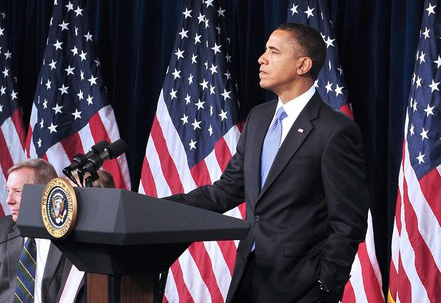
After a year and two weeks in office, President Barack Obama and his approval ratings have suffered more than just the slings and arrows of outrageous fortune. As virtually all recent presidents before him, the first year has been unkind and even hostile. But, unlike his predecessors, this president faces a far greater number of problems, crises and challenges with solutions that range from difficult to intractable or not possible.
Without a calamity such as Pearl Harbor or a real economic depression to rally the nation, our government today is simply incapable of addressing let alone making tough decisions over jobs, climate, energy, the economy, healthcare or Social Security and other mandatory spending programs — choices that have proven too difficult and too politically deadly to address in a serious manner.
Most Americans do not need a recitation on the bevy of domestic and international issues that beg solution and, like new forms of disease, are resistant to politically administered antibiotics. Nor are Americans unaware of a government that is badly broken.
Internationally, as our troops draw down in Iraq, the region remains explosive. Iran poses excruciating challenges over its regional ambitions, nuclear or otherwise, and an Israeli pre-emptive attack on Iran’s nuclear infrastructure is neither impossible nor far-fetched. While our latest strategy takes hold in Afghanistan, at best that war will be a close run thing as long as President Hamid Karzai’s government remains dysfunctional, corrupt and incompetent. The United States and Pakistan have not settled many of their differences over containing the Taliban on both sides of the border with Afghanistan, and the so-called trust deficit has yet to be closed even partially. And India and China complicate rather than ease our choices.
Domestically, the 2010 midterm elections do not look auspicious for the president. While numerically it would take close to a miracle for the Republicans to regain control of both houses of Congress, Democrats are likely to lose a substantial number of seats. For the moment — and moments are fleeting — despite its overall unpopularity with voters over its performance in Congress, the Republican Party sees itself on a roll especially after Scott Brown’s victory in the Massachusetts election for Sen. Ted Kennedy’s seat.
Of course, possibly more plentiful and onerous than this list of intractable issues and impossible choices is the advice, solicited and otherwise, pouring into the White House on what to do at this moment of unpopularity. Every columnist and political junkie has his or her own idea for action, some of merit, many not. This column takes a more unorthodox stance.
Mr. President, there is very little you can do in your situation unless you tackle the most critical issue: a political system and form of governance that are so broken and rife with partisanship no serious and effective actions can be taken that will assure positive impact. Take budget deficit reduction. Last week the non-partisan Congressional Budget Office presented its projections of the budget, debt and deficit to the House. That picture is an ocean of red ink mounting into the trillions of dollars without any obvious means of being checked.
Your administration proposes a future freeze on discretionary spending that accounts for about one-sixth of the $3.8 trillion budget. Yet this year’s projected deficit is about $1.6 trillion. This is a joke. Furthermore, the Senate could not agree on a budget reduction commission because of the arcane procedures that require 60 votes for most legislative action. And even if a congressional commission were established, it lacks the authority to cut both deficits and the national debt. Reforms proposed, for example, by the non-partisan Sept. 11 Commission still have not been implemented — steps that pale in comparison to confronting the nearly $14 trillion in debt facing the nation.
Ironically, Sens. John Kerry, D-Mass., and John McCain, R-Ariz., may have been lucky not to win the presidency. And indeed, it is almost certain that no single American ever will have the requisite experience, skill, leadership and intellect to take on the crises and challenges facing the nation. The best that can be done is to try, and that is not good enough.
The overriding strategic issue is how to govern from a position of weakness in a system in which governance has broken down. Your administration and staff are understandably fixated if not obsessed with some of specific issues noted above. That aperture is far too narrow.
If you can figure out how to govern in this dysfunctional and broken political system, many of these other seemingly intractable issues might find resolution. That should be your focus. If not, despite all the bullish talk about America, current forces and realities are looming bears. The trajectory is bad, and the tragedy could be that there is little you or anyone else can do about it.
Harlan Ullman is senior adviser at the Atlantic Council and chairman of the Killowen Group that advises leaders of government and business. This column was syndicated by UPI. Photo Credit: Getty Images.
Image: ObamaPodium.jpg
